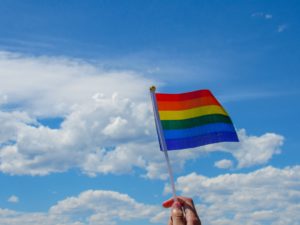Pronouns: she/her

For me, my first experiences with mental health came at the same time as my first thoughts about my sexuality. In many ways, I can’t imagine knowing one without the other, my mental health and sexuality both coming together suddenly to become huge parts of who I am, where before they had played no role.
Growing up I didn’t feel particularly different to most of my friends, or any of the other people at school. I was outgoing and felt comfortable socialising with all genders, whether it was playing football on the playground or creating dance routines after school. With my girl friends, I was able to join in with conversations about crushes on boys, and always enjoyed being part of the comings and goings of young school relationships. With all young people assumed to be straight, and noone around me ever discussing sexuality (except to say things like ‘that’s gay’ in a derogatory way), I never felt any reason to question who I was.
However, as I reached the age of 16, I began to form a friendship group outside of school, some of whom openly identified as LGBTQ+. Until I met them, I didn’t fully realise that nice, friendly, talented, smart, young people (especially young girls like me), could be anything other than straight or cisgender. I had never seen any examples of it at school, in films, on TV, or in music. With the language amongst my classmates showing nothing but negativity around being gay, I realised I had assumed I would never be part of that community, without really knowing anything about it. Suddenly, with these wonderful new people in my life, I began to question what I knew.
A common misconception about being in the closet is that you already know you are gay, and are choosing to hide it from others. For me, this wasn’t the case. When I began to question my own sexuality, it wasn’t so much that I had a secret I could not tell people – it was more that I couldn’t figure out what my secret was. I didn’t feel gay. But I didn’t feel straight either, and I certainly didn’t realise being bisexual was a serious option. I had only ever heard others talk about bisexual people as ‘greedy’ or ‘attention seekers’ – and I knew I was neither of those things. This confusion about who I was began to really upset me. I remember spending days, weeks and months feeling completely overwhelmed with thoughts – Who am I? Will I ever figure it out and feel comfortable? Am I the only one feeling like this? Will I be accepted for who I am? Am I a bad person like those words make LGBTQ+ people out to be?

As these worries grew bigger, I began to experience symptoms of anxiety for the first time. I didn’t feel like myself. I was on edge, shaky, and nervous about everything. I couldn’t concentrate in class and got upset easily over small things. Worst of all, I began to have frequent anxiety attacks seemingly out of nowhere. One moment I’d be in class, the next I’d be alone, trying to control my breathing. It was an extremely difficult time. However, as my group of LGBTQ+ friends outside school grew bigger, I eventual met some people who identified as bisexual for the first time. Discovering that this too was a real option, and that again, some really great people identified as such, helped everything finally click for me. After months of confusion, I realised that I was, in fact, bisexual.
In the following months after figuring out my sexuality, I came out to my school friends, parents, and family, who I am very grateful to say were all loving and welcoming, even if it took them a little while to understand it themselves. It has now been around 5 years since I came out, and the LGBTQ+ community continues to be one of the most important aspects of my life. Many of my closest friends are part of the community, and we are lucky enough to celebrate being who we are together. Although I still experience anxiety as a legacy of that period in my life, I am proud of who I am, and that gives me the strength to manage the ups and downs that come my way.
If you would like to write a blog featuring your experiences, please read our submission guidelines here, and get in touch via communications@stem4.org.uk.


